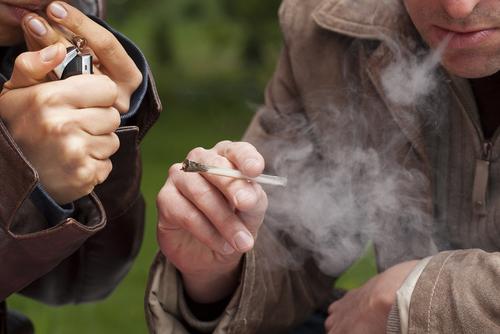Most drug users seek a substance that makes them feel high. They try different substances and sometimes have to use more than one drug to get the feeling. Many drugs in the market will make you feel high. So, what does being high feel like? This article answers this question and outlines the feelings triggered by different drugs.
What Does Being High Feel Like?
Different recreational drugs trigger different high feelings. Here we reveal 10 drugs, meaning 10 types of high feelings.
 1. Poppers
1. Poppers
This drug’s effects are felt immediately after the user inhales and last for about two to three minutes. The high feeling caused by this drug increases the heart rate and causes blood to rush through the heart and brain. You will feel dizziness, pounding headache, a flushed face and neck and light-headedness. Poppers are not addictive and its users develop tolerance within two to three weeks of continual use.
2. Amphetamines
This stimulant affects the nervous system and increases the heart rate. The user feels its effect after an hour and this feeling may last for several hours. Amphetamines users have increased confidence, are more sociable and have high energy levels. The hyperactivity may last for hours but as the energy reduces, users report feelings of irritability, restlessness, dizziness and anxiety. The stimulant is addictive and its effects including insomnia, depression, moods swings, lethargy and hunger.
3. Marijuana
This drug has mild but noticeable physical effects that include a high pulse rate, low blood pressure, dry mouth, high appetite, bloodshot eyes and dizziness. No cases of fatal overdose have been reported so far, but some people argue that using the drug influences users to try other hard drugs such as heroin. Cannabis users become dependent on it to be sociable, especially after using the drug heavily and regularly.
4. Cocaine
Most of us are familiar with cocaine because it appears in novels and TV series. So if you smoke coaine, then what does being high feel like in this condition? Cocaine triggers a physiological arousal that causes feelings of exhilaration and no need to eat anything. Users feel tired and are indifferent to pain. The high feeling lasts for 15-30 minutes, creating an urge to use the drug every 20 minutes. Users claim the drug reduces stress and do not experience a strong craving for it after reducing the dosage. Withdraw from cocaine causes exhaustion, depression, agitation, severe anxiety and restlessness. Large doses for a short period may cause confusion and depression.
5. Ecstasy
Users experience the effects of this stimulant after 20-60 minutes and the effects last for 3-6 hours. Physical effects include dilated pupil, tight jaws, nausea, sweating, a dry mouth and throat, increased blood pressure and heart rate and loss of appetite. Ecstasy affects the nervous system, increases brain activity and affects body temperature. Dancing in the heat for long after use may lead to dehydration and overheating. Though not addictive, continued use could lead to severe depression and other mental illnesses.
6. Heroin
Heroin causes drowsiness, a feeling of warmth and content, creating a sense of well-being and detachment from pain and worry. New heroin users may experience nausea, vomiting and headaches. Heroin is smoked or injected and its long-term use builds the users’ tolerance. One has to increase the dosage to feel high. Injection gives an immediate and strong rush. Heroin users may become dependent on the drug whether they smoke or inject. However, they may prefer injections in the long term to feel high.
7. Ketamine
We can answer the question, “What does being high feel like?” by considering the immediate effects of a drug on your body. Ketamine is a strong painkiller that makes you feel relaxed. You may experience hallucinations; users see both time and space differently, a state called "trip". Ketamine affects your heart rate and blood pressure. You may feel confused, frightened or sick. The drug affects your memory and causes the Ketamine bladder syndrome. Injections affect your veins and sharing needles increases your risks of HIV and hepatitis.
8. LSD
LSD will trigger a good or bad trip. And it may make you feel relaxed and happy in the good trip. When experiencing a bad trip, you will feel frightened and panic. LSD triggers good or exciting and bad or miserable hallucinations as well. You may feel confused and experience “flashbacks” when you remember or relive the feelings of confusion and fright. LSD users that experience bad trips may even harm themselves.
9. Magic Mushroom
Using magic mushroom will either give you a good or bad trip. You will feel happy, chilled out and confident when experiencing a good trip, but a bad trip makes you feel frightened. Some mushroom users feel imaginative, creative, sensitive and spiritually enlightened. The harmful effects include feeling sick, tummy aches, diarrhea, frightened or disoriented. You may experience flashbacks after using the drug for a while. Feeling disconnected from reality is dangerous.
10. Methamphetamines
Methamphetamines make you feel high for 4-12 hours followed by a severe comedown. Users feel more energetic, awake, aroused and less hungry. You may also feel agitated, jittery, anxious and aggressive. Other effects include a high heart and blood pressure and a high risk of a heart attack. It reduces your inhibitions, which encourages you to take risks you would not take when sober. It is addictive and may lead to psychiatric illness or psychosis, which may in turn lead to homicidal or suicidal thoughts. Its overdose can lead to death.
